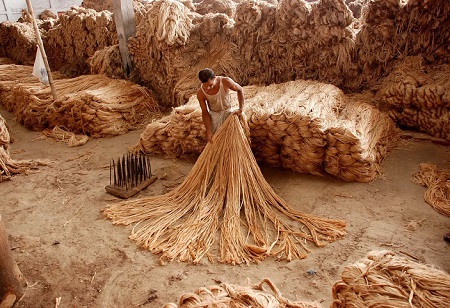Indian Jute Mills Association (IJMA) said raw jute price ceiling is going to be counterproductive for jute cultivation and sought the intervention of West Bengal Chief Minister Mamata Banerjee to take up the matter with the Centre to analysis the decision by the Union government. The jute mills lobby body seeking to quash or at least revise the raw jute price ceiling level, opined that the Jute Corporation of India may be activated to get jute from farmers and supply the same to the Industry under linkage of jute bag supply orders. The jute regulator Jute Commissioner's office has imposed a price ceiling of Rs 6,500 per quintal on raw jute trade in order to make sure supply of raw material to the mills at a fair price.
Nevertheless, a section of mill sources said on Monday that pressuring the government to review the step will also have a negative impact and hoarding of raw jute will only rise.
"The jute farmer will be dis-incentivised to cultivate raw jute next year with these regulations in place. The West Bengal jute farmers will be worse off than their counterparts in Bangladesh. Indirectly this will result in growth of the Bangladesh industry at the cost of India," IJMA stated in the letter to the Chief Minister. "This policy of fixing a ceiling price when jute is still held at the farm level will never allow the jute industry to grow and meet the increased demand of jute bags. We request you to take up the matter with the Central government for review of the price ceiling order by the Jute Commissioner," the letter urged.
IJMA asserted similar grade of jute is priced at Rs 7,000 per quintal and said the industry has the capacity to meet the demand provided raw material is available and expanses are commensurate with the rate offered for jute bags for packaging food grains.
Officials of the Jute Commissioner's Office said price ceiling and stock limits had been imposed for the benefit of the jute mills in terms of price of fibre and supply.
"The issue of availability and resultant affordability of raw jute remains the biggest bottleneck for growth of the jute sector. For two consecutive years, we have been faced with a short supply of raw material. The year 2020-21 witnessed record low output of raw jute, at only 58 lakh bales, as farmers and farm labour had been hit with the Covid19 pandemic," IJMA claimed.
"Availability of just 85 lakh bales is insufficient for the Industry's requirements. By our calculations, 100 lakh bales of jute crop are required by the Industry to cater to the increased requirement of bags of the food grain sector," IJMA stated.
